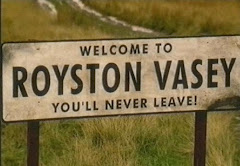Unfortunately I cannot place the presentation on this blog as you will see it in the lesson because it contains video extracts. Therefore I have uploaded the slides and the videos separately!
British Sitcom 1960 - Present ppt.
Here are the the extracts we shall be discussing. Remember you cannot get youtube in school. Mr Moore is in the process of putting all the clips on the school intranet.
- What is narrative?
- How important is it for audiences and institutions?
- Do sitcoms have similar narratives?
- What familar narratives do you know?
- Basic 5 point structure
- Todorov: Equilibrium, Disruption, New Equilibrium
- Levi-Strauss: Binary Oppositions
- Barthes: Enigma Codes & Action Codes
- Propp: Stock characters
Aim: To understand the codes and conventions of TV sitcom and to recognise some of the problems when attempting to define and explain sitcom.
Distribute the starter activity sheet. In pairs unscrabble the radio shows and match with the date. Clue: We mentioned them last week! Discuss the questions at the bottom. Introduce the aims of today's lesson. Begin the powerpoint presentation - click below:
Sitcom: An Introduction ppt.
You all have a handout so concentrate on listening and writing annotations or helpful comments next to the apporpriate slides. Please ask if you want me to slow down or repeat something. Throughout the ppt there are discussion points so I expect to see you all contributing. Think about:
- Definitions & codes & conventions of sitcoms
- Types of sitcoms - diversity!
- TAFLINGER'S 3 categories: Actcom, Domcom, Dramedy
- Characters and humour
- Basic Stuctures
- Background & context
- Use of generic codes & conventions
- Comic strategies
- Form and structure
- Type of Sitcom










